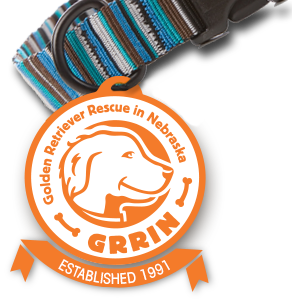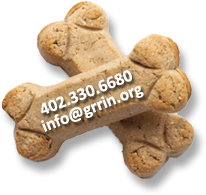Foster homes are truly the backbone of our rescue program. Fostering is a wonderful way to lend a hand and enjoy the sweet, silly character of another Golden in your home
The principle behind fostering is to provide the dogs entrusted to our care with a safe, loving environment where we can evaluate their habits, health and behavior. This allows us to match each dog to the right “forever home” while providing their new owner with useful information.
The availability – or lack – of foster homes directly impacts the number of Golden Retrievers we can help. We need caring, responsible people to join our foster home team by opening their homes and hearts to our rescued Goldens.
Interested? You will go through the same process as a family wanting to adopt, so please start by calling the GRRIN goldline at 402.330.6680.
What will I need to do as a foster parent?
Foster homes are responsible for the daily care of the foster dog, including:
- feeding
- exercising
- socializing
- brushing and grooming as needed
- reinforcing basic obedience commands
- observing and evaluating general behavior and temperament
- and, of course, providing love and security to a special Golden at an often difficult time in their life.
GRRIN foster homes play a major role in facilitating the dog’s adoption to a new home. As a foster parent, you’ll make recommendations to help select the best adoptive family for your foster Golden (since you know him or her best!). Prospective owners will meet your foster dog in your home.
A preliminary evaluation is done by a GRRIN volunteer before a Golden is accepted in the program. Once accepted, the Golden is placed into one of our foster homes where its personality is evaluated in a “home” environment. The dog also receives a veterinary exam and is heartworm tested, updated on inoculations, spayed or neutered, and evaluated for existing medical problems. The Golden is then ready for adoption when a potential adoptive family is matched with him or her.
How long does the dog stay in foster care?
If the Golden is healthy, two weeks to two months is typical. Dogs with special needs may stay longer in foster care.
Do I need a fenced yard to foster?
Yes, a fenced yard is required for all dogs; invisible fencing is not acceptable. Foster dogs must NEVER be allowed to run loose. Outside of a fenced yard, the dog must be on leash at all times.
Do I have to be home with the dog all day?
No. Many of our foster parents are employed full- or part-time and still provide a quality environment for the dog. However, our first concern is safety: for you, your family, your own dog(s) and the rescue dog. Therefore, we suggest that any time you are unable to directly supervise the foster dog, he should be confined to a small, secure area. GRRIN has training crates to loan to foster families.
How much time does it take to foster?
It takes from an hour or two a day to however much time you care to spend with the dog. Some foster parents teach their foster dog obedience or other skills as a way to make the dog as adoptable as possible.
May I choose which dogs I foster?
You may set limits on the kinds of dogs you foster. If you’re asked to foster a dog that doesn’t seem right for you, you can say “no.” If a foster dog proves difficult to handle, he can be placed elsewhere.
How much does it cost to foster?
Lack of funds shouldn’t prevent you from fostering, but you will have some expenses for good quality food, telephone calls, and any toys you choose to provide. Necessary veterinary expenses, including heartworm preventative, are paid by GRRIN.
What if I have questions or problems with the dog?
All foster homes receive guidance on routines and special aspects of fostering. Our Foster Home Coordinator, Rescue Coordinator and Caseworkers are available for telephone consultation on behavior or health problems. Being a foster home is greatly rewarding, but you should keep in mind that some rescue dogs are not housetrained, may be ill, or may have had little socialization or obedience training. In spite of these challenges, our foster homes have found that – when given a chance – these dogs not only improve, they flourish.
Will I become attached to my foster dog?
Yes, you undoubtedly will. They bond quickly and give so much back in return for your care and attention. But when you meet the new family who’s ready to provide a permanent, loving home for the dog you’ve helped rescue, you will feel satisfied to see him move on to his new and better life.

